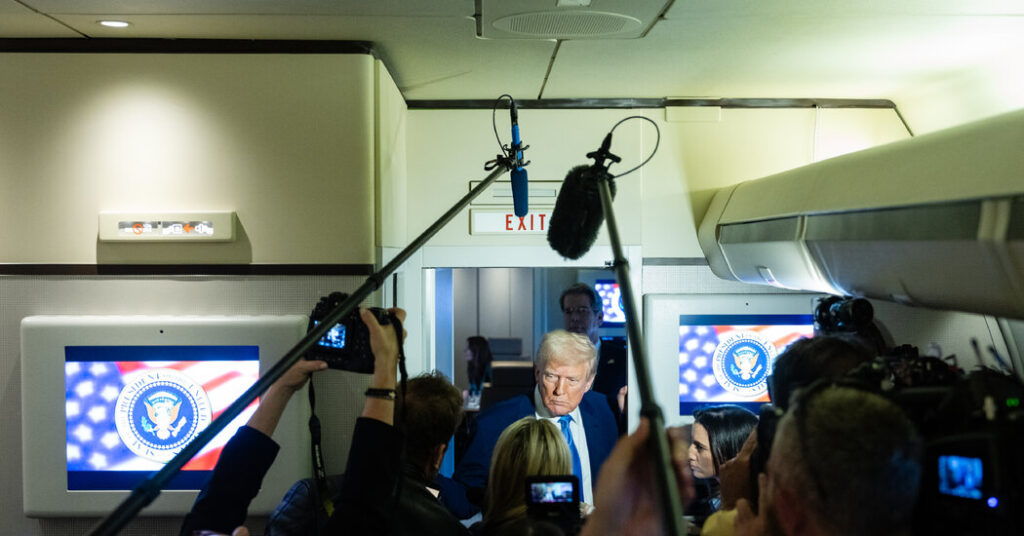Last Wednesday, the Trump administration believed it had a plan to save TikTok.
ByteDance, TikTok’s Chinese owner, along with some of its U.S. investors, and officials in Washington had coalesced around a new ownership structure for the popular video app, four people familiar with the situation said. That structure, the people said, would help TikTok satisfy the terms of a federal law that required the app to find a new owner in order to address national security concerns, or face a ban in the United States.
Under the plan, new investors would own 50 percent of a new American TikTok entity, while Chinese owners would retain less than 20 percent, the limit specified by the law, two of the people said. ByteDance told the White House that Beijing was comfortable with the general structure, two of the people said.
By Thursday morning, a version of a draft executive order from President Trump that outlined the broad strokes of the deal was circulating, according to a copy that was viewed by The New York Times.
Then the plan hit a wall. ByteDance called the White House with the news: Now that Mr. Trump had announced a slew of tariffs on Chinese imports, the Chinese government would not let the TikTok deal proceed, two of the people said.
In response, Mr. Trump bought the app more time. On Friday, he paused enforcement of the federal law, extending the deadline for a TikTok deal into mid-June.
“The report is that we had a deal, pretty much, for TikTok, not a deal but pretty close, and then China changed the deal because of tariffs,” Mr. Trump told reporters Sunday aboard Air Force One.
The standstill highlights how the video app is mired in a geopolitical tussle between the United States and China over trade and tech supremacy. It also illuminates China’s power over TikTok’s future in the United States, raising questions about whether a deal for TikTok will ever get done.
“The parties are too proud to negotiate, and so we’re stuck between two colossal economies that are butting heads against each other,” said Anupam Chander, a professor of law and technology at Georgetown University who has publicly opposed the law targeting TikTok. “TikTok has kind of been the mouse that got caught underfoot between these two elephants.”
The Chinese Embassy in Washington, TikTok and ByteDance didn’t respond to requests for comment. The White House referred The Times to Mr. Trump’s post on Truth Social announcing his extension for the debate over the app.
The administration and ByteDance had been hammering out a structure that would allow TikTok’s biggest U.S. investors, including the firms General Atlantic and Susquehanna International Group, to hold on to their investments while government officials brought in new funds to dilute the app’s Chinese ownership.
The tentative terms of the deal said new investors would own 50 percent of a new American TikTok entity. Current investors would own 30 percent and Chinese owners less than 20 percent, two people with knowledge of the matter said. Private equity giants like Blackstone and Silver Lake, along with the venture capital firm Andreessen Horowitz, had weighed taking a stake in the new entity.
The proposal was laid out in a lengthy and detailed document for investors, three people with knowledge of the matter said.
Two people involved in the deal said there was more work to do. Certain potential new investors viewed any deal as conditional, subject to the due diligence that accompanies any large transaction, they said.
China was always, to some extent, the wild card. The administration’s lead negotiators were not discussing the issue directly with the Chinese government, instead relying on ByteDance’s understanding of Beijing’s position, two people familiar with the matter said. Before the president’s announcement on tariffs last week, ByteDance believed that the Chinese government was comfortable with the structure coming together in Washington, the people said. But even before the tariff announcement, there was no guarantee that Beijing would provide its informal blessing or formal approval.
The talks about TikTok are likely to become even more complicated as a trade war between the two countries escalates. China initiated retaliatory tariffs after Mr. Trump’s announcement, prompting the president to warn on Monday that he would impose additional tariffs of 50 percent on the country if it persisted.
Mr. Trump has repeatedly suggested that he would consider lowering tariffs on China in exchange for its approval of a TikTok deal.
Leveraging tariffs for the negotiations is “really kind of a remarkable effort to coerce a sale of a foreign company,” Mr. Chander said.
But the trade war may still be underway in June, he said, adding: “We may well find ourselves back in Groundhog Day 75 days from now unless the tariffs have been resolved.”
TikTok has maintained for the better part of a year that it is not for sale.
On Friday, ByteDance acknowledged for the first time that it had been involved in negotiations with the U.S. government over the app’s future — but said any decision was ultimately in another party’s hands.
“There are key matters to be resolved,” a spokesperson for ByteDance told reporters in an email. “Any agreement will be subject to approval under Chinese law.”
Maggie Haberman contributed reporting.
https://www.nytimes.com/2025/04/07/technology/trump-tiktok-china-tariffs.html


